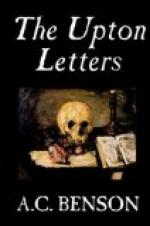Well, it is time to stop. I sit in a little, low raftered parlour of the old inn; the fire in the big hearth flickers into ash, and my candles flare to their sockets. I leave the place to-morrow; and such is the instinct for permanence in the human mind, that I feel depressed and melancholy, as though I were leaving home.—Ever your affectionate,
T. B.
The blue boar,
Stanton Hardwick,
April 21, 1904.
Dear Herbert,—I have made a pilgrimage to Stratford-on-Avon. I now feel overwhelmed with shame to reflect that, though my chief preoccupations apart from my profession have been literary, I have never visited the sacred place before. For an Englishman who cares for literature not to have been to Stratford-on-Avon is as gross a neglect as for an Englishman who has any sense of patriotism not to have visited Westminster Abbey.
And now that I have been there and returned, and have leisure to think it all over, I feel that I have been standing on the threshold of a mystery. Who, when all is said and done, was this extraordinary man? What were his thoughts, his aims, his views of himself and of the world? If Shakespeare was Shakespeare, he seems, to speak frankly, to have had a humanity distinct and apart from his genius. Here we have the son of a busy, quarrelsome, enterprising tradesman—who eventually indeed came to grief in trade—of a yeoman stock, and bearing a common name. His mother could not write her own signature. Of his youth we hear little that is not disreputable. He married under unpleasant circumstances, after an entanglement which took place at a very early age; he was addicted to poaching, or, at all events, to the illegal pursuit of other people’s game. Then he drifts up to London and joins a theatrical company—then a rascally kind of trade—deserting his wife and family. His life in London is full of secrets. He is a man of mysterious passions and dangerous friendships. He writes plays of incomparable depth and breadth, touching every chord of humour, tragedy and pathos; certain rather elaborate poems of a precieux type, and strange sonnets, revealing a singular poignancy of unconventional feelings. But here, again, it is difficult to conceive that the writer of the Sonnets, who touched life so intensely at one feverish point, should have had the amazing detachment and complexity of mind and soul that the plays reveal. The notices of his talk and character are few and unenlightening, and testify to a certain easy brilliance of wit, but no more. Before he is thirty he is spoken of as both “upright” and “facetious”—a singular combination.




